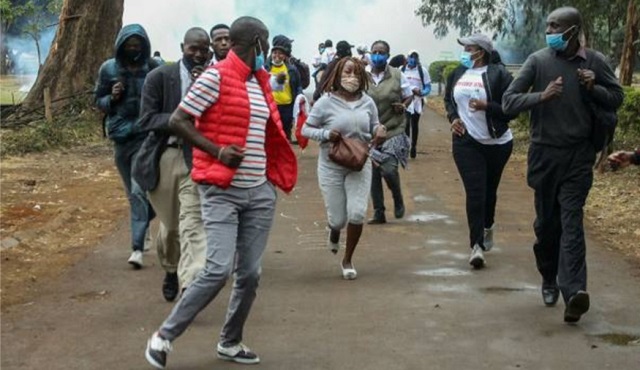
‘Theft doesn’t even stop during a pandemic’
| THE INDEPENDENT | Doctors have gone on strike over a lack of protective equipment, and protesters have taken to the streets in anger at the abuse of medical funds, many wearing T-shirts emblazoned with #arrestCovidthieves.
Public uproar in Kenya in recent weeks has highlighted the depth of frustration over the handling of aid to combat coronavirus, not just in the east African country but across the continent as a whole.
Uganda has recalled its ambassador to Denmark and her deputy after the duo were recorded in a Zoom call allegedly plotting to pocket money allocated to deal with Covid-19.
In Somalia, a court handed down heavy sentences to four top health officials for misappropriating pandemic relief funds.
In South Africa, the government’s procurement scheme for medical equipment has been hit by allegations of corruption.
“Theft doesn’t even stop during a pandemic,” said Kenyan anti-corruption activist Wanjeri Nderu, who has rallied protesters under the hashtag #stopCovid19thieves. “We have people dying while some are stealing.”
The government needs to come clean about where they have spent this money so Nigerians and the international community will have more confidence that [it] can spend judiciously
Auwal Ibrahim Musa Rafsanjani, Civil Society Legislative Advocacy Centre
Africa may have the lowest number of coronavirus infections in the developing world, but accusations of graft are rife. In a stark reminder of the pervasive presence of corruption, leaders across the continent are facing public outrage over a string of suspect contracts.
“It is becoming a trend (in Africa). These concerns were already there even before Covid-19. But Covid-19 has just given an opportunity for another level of looting, with public procurement being a key epicentre of corruption across the board in different countries,” said Sheila Masinde, executive director at the Kenyan chapter of Transparency International.
Across Africa, officials are being swept up in investigations into whether they used their positions to siphon funds intended to tackle the pandemic, deaths from which have so far been limited to fewer than 30,000 on the continent, according to official figures.
Uhuru Kenyatta, Kenya’s president, recently asked authorities to speed up investigations into alleged impropriety at the state-run Kenya Medical Supplies Authority, which have led to a probe by the country’s Ethics and Anti-Corruption Commission. Kenyatta said anyone found culpable, no matter their position, should be “brought to book”.
Jonah Manjari, the head of KEMSA, and other officials have been suspended over alleged irregularities during the procurement of personal protective equipment for use by healthcare workers on the front lines. Manjari told the Financial Times he was confident he would be “cleared because there is no wrongdoing”.
In Uganda, local media published a leaked audio in which the country’s ambassador to Copenhagen, Nimisha Madhvani, her deputy, and other staff members are heard laughing as they appear to be concocting a plan to share money among themselves that is meant to be used to deal with the outbreak. Madhvani did not reply to a request for comment, but Patrick Mugoya, permanent secretary in Uganda’s Ministry of Foreign Affairs, expressed “grave concerns about the allegations” in a letter, adding that the auditor general will “carry out a thorough investigation”.
Civil society leaders across the continent complain of a lack of transparency on the use of funds as well as, in some cases, seemingly inflated prices. In Nigeria, CivicHive, a good governance NGO, earlier this month uncovered Bureau of Public Procurement data showing that the Federal Ministry of Health had spent N37.06m ($96,000) on 1,808 ordinary face masks, about $53 apiece.
“The government needs to come clean about where they have spent this money so Nigerians and the international community will have more confidence that (it) can spend judiciously the money that has been made available for the fight against Covid-19,” said Auwal Ibrahim Musa Rafsanjani, executive director of the Abuja-based Civil Society Legislative Advocacy Centre.
In many cases, pandemic-related graft has reflected what was already a culture of impunity. In South Africa, politicians from the ruling African National Congress have been implicated in fraud over the supply of PPE to the government. In a letter to ANC members in late August, President Cyril Ramaphosa admitted that “there is a sense of anger and disillusionment at reports of corruption in our response”, and that the party was “Accused No. 1” in the dock.
Ramaphosa has promised to clean-up the graft that became endemic under his predecessor Jacob Zuma but has so far made limited progress.
“Tell me of one leader of the ANC who has not done business with the government,” Ace Magashule, the party’s secretary-general and an old ally of Zuma, told South Africa’s News24 this last month after revelations that his sons had been awarded contracts related to Covid-19. Zuma said at the time that Ramaphosa’s letter was “a diversion, a public relations exercise by which you accuse the entire ANC in order to save your own skin.”
The main opposition Democratic Alliance added that Ramaphosa was only offering “a longer deflection mechanism from the fact that the ANC still cannot and will not deal decisively with its own corruption”.
As Transparency International’s Masinde noted, the problem is not South Africa’s alone: “These are similar concerns African countries are dealing with.”
****
Source: FT
The post Africa’s Covid-19 corruption appeared first on The Independent Uganda:.
from NEWS ANALYSIS – The Independent Uganda: https://ift.tt/3mHFAv6
0 Comments